Jazz/funk superstar shares his musical upbringing, establishing himself in the big city and (gasp!) stepping into Jaco’s shoes!
Exclusive interview with FBPO’s Jon Liebman
February 15, 2010
Born into a musical family in Philadelphia in, Victor Bailey grew up surrounded by music. Starting on the drums and then switching to bass, Victor began gigging at a very young age. Having been declined by the U.S. Navy because of asthma, Victor enrolled at Berklee College of Music, where he found himself surrounded by scores of other talented players, many of whom went on to stellar careers.
After being hired by trumpeter Hugh Masakela, Victor moved to New York, where he quickly became an in-demand bass player, performing and/or recording with Sonny Rollins, Miriam Makeba, Lenny White, Don Alias, Larry Coryell, Sadao Watanabe, Michael Urbaniak, Ursula Dudziak, Kenny Kirkland, Mike Stern, Dennis Chambers, Poogie Bell, Kevin Eubanks and many others. Victor’s association with drummer Omar Hakim eventually led to his earning the bass chair in Weather Report after the departure of bass legend Jaco Pastorius.
Over the years, Victor has played on over one thousand recordings with everyone from Weather Report to Michael Brecker to LL Cool J to Mary J. Blige. In the mid-‘90s, he toured with pop megastar Madonna. Victor has released two solo CDs, Bottom’s Up and That’s Right, which showcase not only his superb bass playing abilities, but also his talents as a writer, arranger, keyboard player, drum programmer and singer. Victor remains actively involved in the New York music scene, writing, recording and performing.
FBPO: Growing up immersed in music the way you were, it seems inevitable that you would become a professional musician.
VB: I was born into a musical family. My dad, Morris Bailey Jr., is a composer, arranger, producer, saxophonist, artist and teacher. During the ’60s, ’70s and ’80s, his songs were recorded by some of the great R&B artists, including Patti LaBelle, The Stylistics, Blue Magic, The Spinners, Harold Melvin & the Blue Notes and Nina Simone. As a saxophonist he played with McCoy Tyner, Jimmy Smith, Lee Morgan and Reggie Workman. My uncle, Donald Bailey, is a legendary jazz drummer, probably best known as the drummer in the trio of jazz organist Jimmy Smith. My sister, Brenda, sang with the hit-making, disco era group, Creme D’Cocoa, and sold millions of records. My brother, Morris III (“Doc”), never practiced a day in his life, yet can write, sing and play any instrument. Even my mom Vera had a wonderful singing voice, although she never pursued music as a career.
And then there’s a great family music mystery. Once when my dad and uncle Donald were young, they were in the house playing and my grandfather, Morris Sr., came downstairs, grabbed the drumsticks from Uncle Donald and played the drums so well no one could believe it! Even after doing so, however, he never talked about how or why he could play the drums, so no one ever knew. After he passed away, while going through his things, the family found a professional 8×10 black and white photo of him sitting at a drum set with his name at the bottom. It was a standard show business publicity photo. Obviously, he had some professional experience at some time, but no one knows when or where.
FBPO: While hanging around your dad so much, were you able to appreciate what a big deal it was that he was making music with Patti LaBelle, The Stylistics, The Spinners, McCoy Tyner, Jimmy Smith, Lee Morgan, Reggie Workman and so many other music greats, or were these people just “Dad’s friends?”
VB: Well, sort of a combination of both. All of those people were in the house everyday when I came home, so I wasn’t overwhelmed by their fame so much. But I was well aware that the music that I was hearing was world-class. Not the average, but music that made the hair on my arms stand up.
FBPO: How did you end up a bass player, an event you have described as “the most life-changing thing that ever happened” to you?
VB: I was in a band with some neighborhood guys, playing drums, and the bass player didn’t want to play with me because I was too serious. He was a grown man and this little kid was telling everybody what to play. So he quit the band and walked out. The only other person around who played anything was a drummer. So I said, “I’ll play bass.” Although I had never played before, I instantly understood the instrument. I not only played all the songs, but added fills, or “runs,” as we called them. My father, who never came downstairs to listen to any of my bands, came charging down the stairs yelling, “Who’s playing bass? Who’s playing bass?” When he saw it was me he said, “You should be a bass player.” I said, “I know.” My days as a drummer were over.
FBPO: Philadelphia has such a rich musical heritage. How do you think growing up in Philly influenced you musically, compared to, say, Detroit or Chicago or Nashville or any of the other music meccas in the U.S.
VB: Basically, having the father I did, I got to see what it really was to be a serious musician and what it really is to be in the business of music. That’s a bigger influence than being from Philly. But giving credit where it is due, Philadelphia is just a musical town. Whether it’s jazz, R&B, pop or anything else, Philadelphia musicians have always been very knowledgeable and very skilled, theoretically and instrumentally. And, probably must importantly, Philly is a feel town. If you have the hair, the looks or the moves, but not the musicality, you won’t get far there. If folks are not feeling what you do, you can forget it.
FBPO: Tell me about your experience at Berklee College of Music. What was the biggest thing you learned there?
VB: Like at any school, you learn the basics of music theory to the point where it becomes second nature. The best part was that we played all day and night. I learned how to play! My class included Branford Marsalis, Jeff “Tain” Watts, Kevin Eubanks, Greg Osby, Wallace Roney, Cindy Blackman, Terri Lynne Carrington, Stu Hamm, Steve Vai, Rachelle Ferrell, Donald Harrison, Aimee Mann… just an amazing array of talent. And all we did was mix and match all day. So, unlike some other schools, where guys come out having sat in a classroom for a couple of years, we were playing the whole time. I came to new York with my chops and energy way up.
FBPO: It must have taken a lot of guts to pack up and move to New York with no money and no real prospects of employment or success.
VB: It wasn’t difficult at all. I had about six weeks of work in New York with trumpeter Hugh Masakela when I got there. By the end of the first week, I was getting calls for gigs or sessions every day. So, from the day I got off the train, literally, I was in demand, as I knew I would be.
FBPO: How did it feel taking over for Jaco in Weather Report?
VB: It felt great! I don’t know anything about “taking over” for anybody. I am the bass player of Weather Report. Period. I never thought of myself as being after anybody. If you ever meet our drummer, Omar Hakim, ask him. He will tell you we didn’t give a fuck about anybody who was in that band or anybody that came before us. My favorite bass player of all time is me. The best band Weather Report ever had, and the best records they ever made, are the ones with me playing. So, I’m not quite sure what to say when I’m asked about “taking over” as if I gave a fuck about Jaco. I was the man out of all the bassists “WR” ever had, so how else could that feel but good!
FBPO: What was it like to work with Joe Zawinul?
VB: Joe stands out among the crowd in the sense that he was only concerned with the quality of the music. So much of the mindset in the jazz world is just soloing. A lot of cats are happy if the crowd claps for their solos, but they don’t want to work on any music. Joe was always like, “I know you guys can all play, that’s why you’re here. Now let’s work on the music.” As a result, in every band I worked with him, after a while, the band would be on autopilot and the music would just be soaring before you even got to the soloing or improvising. He’d rehearse the phrasing of a melody everyday for a year and drive you crazy, but when you got it the way he wanted it and you felt and heard how great it sounded – with no effort – you really appreciated what he was doing. By the way, I am the only musician, on any instrument, to play in every band Joe ever had. Weather Report, Weather Update, The Zawinul Syndicate and the WDR big band record we did before he died.
FBPO: Talk about your solo CDs.
VB: My CDs give me a chance to do all the things I do. I’ve played on over one thousand records. On ninety-five percent of them, I’m playing grooves that someone else wrote, almost always pentatonic minor. On my CDs, you’ll see I’m much more than that. My new CD, Slippin’ N’ Trippin’, has some Coltrane stuff a lot of folks probably don’t even know I can do and some things you’ve never heard from me before. It’ll be released in late February or early March.
FBPO: What’s keeping you busiest these days?
VB: Everything! Writing and practicing, but mostly touring with my band, The Victor Bailey Group. I’m doing some sideman work, but I’m a bit past that stage, so I can pick and choose what I want to do. I’m so much more of a bass player and musician when you see me with my band than on any other gig, so I prefer to just do my own thing. Once in a while I’ll get called by someone really special, where I can’t resist going, but mostly I perform as the leader. I’m also painting a lot and selling my work.
FBPO: What’s next for Victor Bailey?
VB: Who knows? I’ll just keep playing and writing. Hopefully I’ll continue to get better. That’s about all I can say.
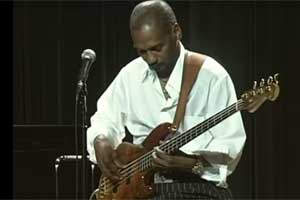

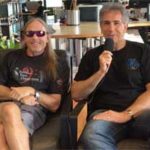
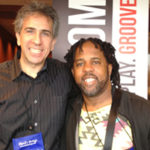

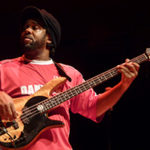
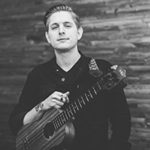
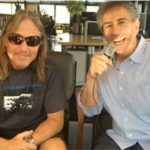
Never had any respect for this clown. He’s arrogant and full of himself. Just another Jaco CLONE who thinks he’s the one who invented modern bass playing.
Greetings from Poland to one of the greatest bass players. Story of Your life is fascinating.. It was good to read about Your musical way. Thank You Victor!!
The very best and most amazing bass player weather report ever had.